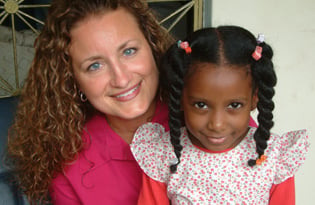When is it right to talk adoption with my child?

There are some 50,000 adopted children living in North Carolina. Twenty years ago, many of these children would not have learned the truth about their birth until their teenage years or later. With the increase in international and inter-racial adoptions, parents must now begin talking with their children from day one.
“The best answer I’ve heard to the question, ‘When should we tell our child she was adopted?’ was by Dr. David Brozinsky, who said, ‘On the car ride home,'” says Brad Nathanson, director of Nathanson Adoption Services in Charlotte.
“There was never one moment when we told our son he was adopted. He has known his story from the beginning,” says adoptive mom Cortney Donelson about her son, Emmett, who is a native of Russia.
Ages 0-3
Parents — Practice the adoption discussion
Children — Songs and bedtime stories
“By starting the discussion when the child is a newborn, it not only benefits the child by allowing her to hear adoption language from day one, but it also benefits parents by allowing them time to practice phrasing different concepts. The process becomes a refinement of the adoption discussion,” says Nathanson.
Debbie, a South Charlotte mother of two daughters adopted from China, says she approached the topic with creativity. “I made up an adoption song for my first daughter, Donna. I also would recite her adoption story at bedtime.”
Ages 4-6
Parents — Modify adoption terms
Children — “Life Books” and storybooks
“When Cate was younger, we used the terms Tummy Mommy and Heart Mommy, but now we say China Mommy and Forever Mommy,” says Tracy Hensley, a University City mother of a 6-year-old adopted from China.
Jennifer Holladay, a social worker with Saint Mary International Adoptions in Charlotte, suggests a hands-on approach. “Many families make what is called a ‘Life Book,’ comprised of memorabilia from their adoption journey. As children begin to ask questions, more information about birth parents and home can be shared,” says Holladay.
Laura Raleigh, a Ballantyne mother whose adopted Chinese daughter Hannah is now 11 years old, also recommends the use of adoption storybooks. “‘When You Were Born in China’ and ‘I Love You Like Crazy Cakes’ have helped begin many important discussions through the years.”
Ages 7-11
Parents — Be honest, but upbeat
Children — Curiosity is natural
“Hannah was 7 when the birth mother questions began,” says Raleigh. “I’ve told her I am certain her birth mother loves her and thinks of her. Hannah has asked if she has siblings. She realizes there is likely another family that lives day to day without her.”
She continues, “Hannah wonders what her birth mother is like. I tell her, ‘She must be kind, compassionate and smart, just like you!’ and, ‘Look at the beautiful girl in the mirror — that is what your birth mother looks like!'”
Ages 12-18
Parents — Be open and supportive
Teens — Self-discovery
“Parents shouldn’t be afraid of questions in the teen years. They should be open and honest, walking with teens through their self-discovery. When they know parents are journeying with them, they will feel grateful for the support and stability,” advises Holladay.
Adoption Talk with Siblings
“I definitely recommend including other family members in the adoption discussion. Siblings should be included to the extent they are developmentally able,” says Nathanson.
“We view it as a normal way a family comes together,” says Lisa Lininger, the Tega Cay mother of 5-year-old Bryan, who adopted from Guatemala, and her 10-year-old biological daughter, Olivia. “We have a globe and point to all the places our family and friends were born. First we find Michigan, where Olivia was born, and then Guatemala, where Bryan was born.”
Author Cathy Crenshaw Doheny is a Charlotte-area award-winning freelance writer.









